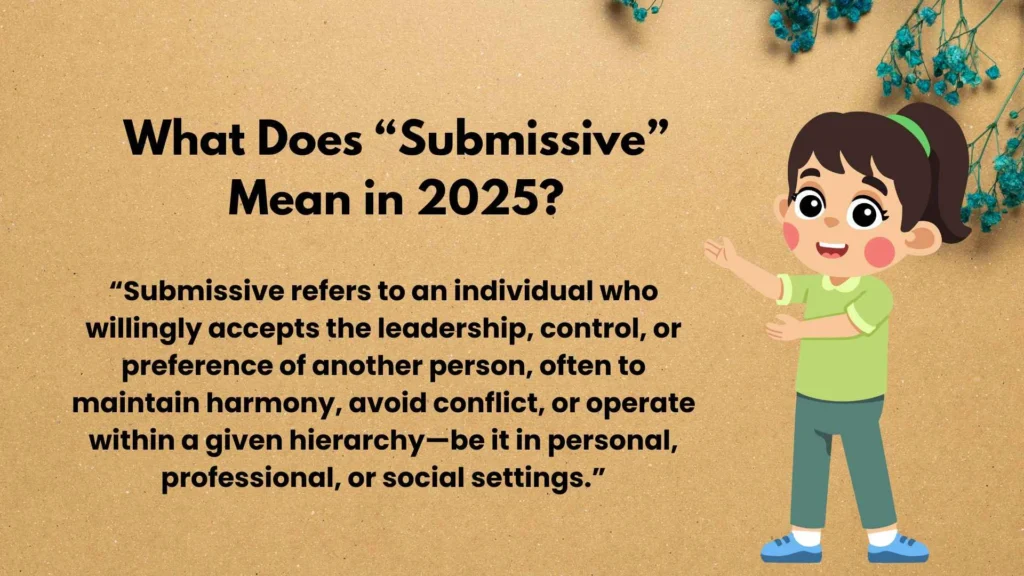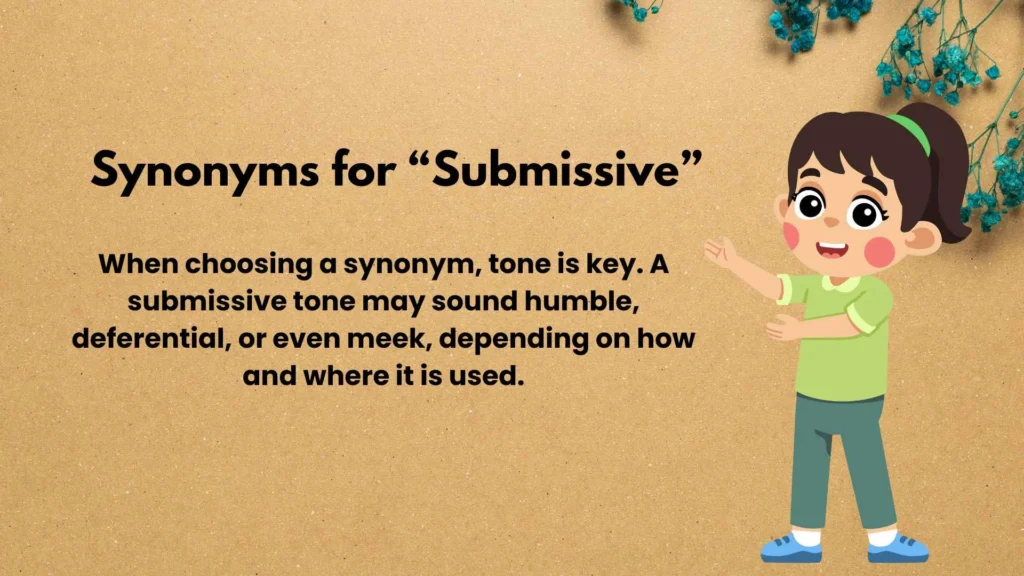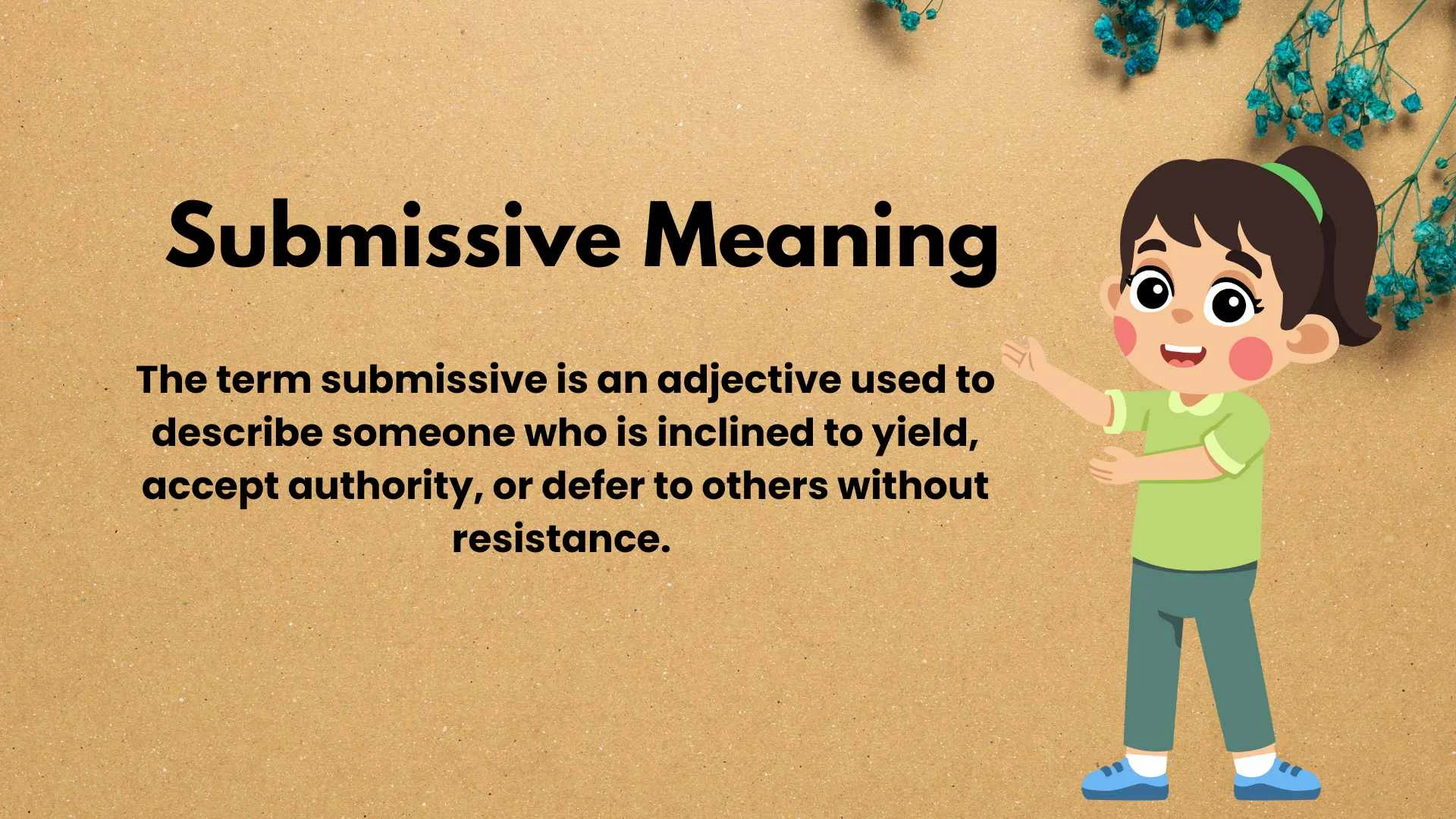Curious about what “submissive” really means? You’re in the right place! This article breaks down the true definition, usage, and context of the word submissive in a way that’s easy to understand and relevant to modern life.
Whether you’ve seen it online, in a relationship discussion, or in personality traits, we’ll help you grasp its exact meaning, how it’s used, and what it does NOT mean — without confusion or complexity.
Plus, with copy and share buttons available, you can instantly post useful points to WhatsApp or social media to start interesting conversations with your friends!
Let’s explore the meaning of submissive together — in the clearest and most relatable way.
In this comprehensive article, you’ll explore:
- The true meaning of the word “submissive”
- Updated usage in both professional and casual contexts
- The psychological undertone behind the term
- Multiple synonyms and alternatives, tailored for tone and setting
- 10 expertly crafted examples to use “submissive” (or its substitutes) in real-life communication
- How to interpret this word when it’s used about you or someone else
Let’s break it all down with precision, depth, and clarity.
🧠 What Does “Submissive” Mean in 2025?

The term submissive is an adjective used to describe someone who is inclined to yield, accept authority, or defer to others without resistance. While the core definition hasn’t drastically changed over the years, the interpretation and connotation of “submissive” have evolved dramatically.
✍️ 2025 Modern Definition:
“Submissive refers to an individual who willingly accepts the leadership, control, or preference of another person, often to maintain harmony, avoid conflict, or operate within a given hierarchy—be it in personal, professional, or social settings.”
🧬 Core Traits of a Submissive Personality:
- Passive or compliant in conflict situations
- Cooperative and often avoidant of confrontation
- Emotionally attuned to others’ needs
- Responsive rather than reactive
- May appear dependent or agreeable to authority figures
Important Nuance (2025 Update):
Being submissive does not always equate to weakness. In emotionally intelligent frameworks, it can reflect restraint, respect, or self-awareness—qualities now highly valued in leadership and interpersonal dynamics.
🔍 Deeper Interpretations of Submissiveness
Understanding submission today isn’t one-dimensional. It’s vital to consider context, intent, and power dynamics.
| Context | Interpretation |
|---|---|
| Relationships | A choice to prioritize emotional balance or surrender control to build trust |
| Workplace | Following authority or avoiding dissent to maintain harmony or job security |
| Cultural/Religious | A traditional or spiritual expression of humility and obedience |
| Psychological | Linked to personality traits like agreeableness, people-pleasing, or attachment |
| AI & Tech | Refers to systems that adapt to user commands without questioning input |
💡 Insight (2025):
With the rise of AI, the term “submissive” is also increasingly used to describe machine behavior—such as virtual assistants, robots, and chatbots that respond to human instruction without debate. This has influenced how we interpret the word in human contexts too.
💬 Synonyms for “Submissive” — Based on Tone & Intent

When choosing a synonym, tone is key. A submissive tone may sound humble, deferential, or even meek, depending on how and where it is used.
Here are the most contextually accurate alternatives in 2025:
🔹 Professional Settings:
- Compliant – follows rules or expectations without resistance.
- Yielding – ready to concede or adapt to others’ positions.
- Deferential – respectful submission to authority or expertise.
🔹 Emotional or Interpersonal Settings:
- Humble – modest and willing to put others first.
- Accommodating – eager to meet the needs of others.
- Docile – calm and obedient, usually without protest.
🔹 Psychological/Behavioral:
- Passive – lacks assertiveness, avoids conflict.
- Obedient – willingly does as instructed, especially in a hierarchy.
- Receptive – open to ideas, feedback, or direction.
🔹 Neutral & Positive Framing (2025 Trending Terms):
- Emotionally Intelligent – self-regulating in the face of authority or conflict, without emotional escalation.
📘 10 Expert Examples Using “Submissive” & Alternatives
Let’s look at expertly crafted examples to help you recognize when to use “submissive” or choose a more nuanced alternative:
1. Workplace Email Example (Professional)
Instead of:
“She was submissive in the meeting.”
Say:
“She remained deferential during the discussion, letting others share their ideas first.”
2. Relationship Advice Column
“Being accommodating doesn’t mean losing your identity—it means finding balance in communication.”
3. Psychology Report
“The patient displays a passive demeanor in confrontational settings, likely linked to early attachment patterns.”
4. AI Technology Article
“Modern assistants are designed to be submissive, ensuring a user-first experience through adaptive responses.”
5. Leadership Training Manual
“Strong leadership does not suppress others into being submissive, but encourages mutual respect and contribution.”
6. Parenting Blog
“Children raised in fear may grow up to be obedient but not necessarily independent thinkers.”
7. Personal Essay
“I used to think being yielding meant weakness, but now I see it as my strength—I know when to step back.”
8. Conflict Resolution Seminar
“Sometimes, being compliant is a strategic choice, especially when stakes are high and emotions flare.”
9. Therapist’s Note
“She shows humility, not out of fear, but from a desire to maintain peace within the family dynamic.”
10. Cultural Commentary
“In some traditions, submission is an act of spiritual devotion, not social inferiority.”
✨ Is Being Submissive a Strength or Weakness?
This is one of the most misunderstood questions in human psychology.
The answer? It depends.
In some situations, submissiveness is:
- ✅ A strength: showing emotional maturity, respect, or adaptability
- ❌ A weakness: if it results from fear, low self-worth, or manipulation
As we enter an era driven by collaborative intelligence (AI + human), emotional responses like submissiveness are being re-evaluated as strategic emotional tools, not mere character flaws.
📚 How to Choose the Right Word
Here’s a quick framework to guide your usage:
| If you mean… | Use this word: |
|---|---|
| Respectful silence | Deferential |
| Peacekeeping behavior | Accommodating |
| Obedience to orders | Compliant / Obedient |
| Avoiding conflict due to fear | Passive |
| Honoring hierarchy willingly | Submissive |
| Emotionally calm cooperation | Receptive |
| Yielding after a disagreement | Yielding |
| Polite modesty | Humble |
🧭 Conclusion: Reframing “Submissive” for the Modern World
The word submissive is not just a label—it’s a reflection of internal choice, external dynamics, and psychological positioning. In 2025, people are becoming more aware of the fluidity of power and behavior, recognizing that submission, when chosen with intention, can be a strategic and emotionally intelligent response.
Understanding and using the right synonyms allows for clearer communication, more respectful interactions, and a deeper understanding of self and others. Whether you’re drafting an email, guiding a team, or navigating complex relationships, knowing when—and how—to use “submissive” or its alternatives can make all the difference.

